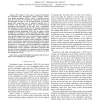Free Online Productivity Tools
i2Speak
i2Symbol
i2OCR
iTex2Img
iWeb2Print
iWeb2Shot
i2Type
iPdf2Split
iPdf2Merge
i2Bopomofo
i2Arabic
i2Style
i2Image
i2PDF
iLatex2Rtf
Sci2ools
145
click to vote
TIP
2010
2010
Projective Nonnegative Graph Embedding
—We present in this paper a general formulation for nonnegative data factorization, called projective nonnegative graph embedding (PNGE), which 1) explicitly decomposes the data into two nonnegative components favoring the characteristics encoded by the so-called intrinsic and penalty graphs [31], respectively, and 2) explicitly describes how to transform each new testing sample into its low-dimensional nonnegative representation. In the past, such a nonnegative decomposition was often obtained for the training samples only, e.g., nonnegative matrix factorization (NMF) and its variants, nonnegative graph embedding (NGE) and its refined version multiplicative nonnegative graph embedding (MNGE). Those conventional approaches for out-of-sample extension either suffer from the high computational cost or violate the basic nonnegative assumption. In this work, PNGE offers a unified solution to out-of-sample extension problem, and the nonnegative coefficient vector of each datum is assum...
Related Content
| Added | 31 Jan 2011 |
| Updated | 31 Jan 2011 |
| Type | Journal |
| Year | 2010 |
| Where | TIP |
| Authors | Xiaobai Liu, Shuicheng Yan, Hai Jin |
Comments (0)

